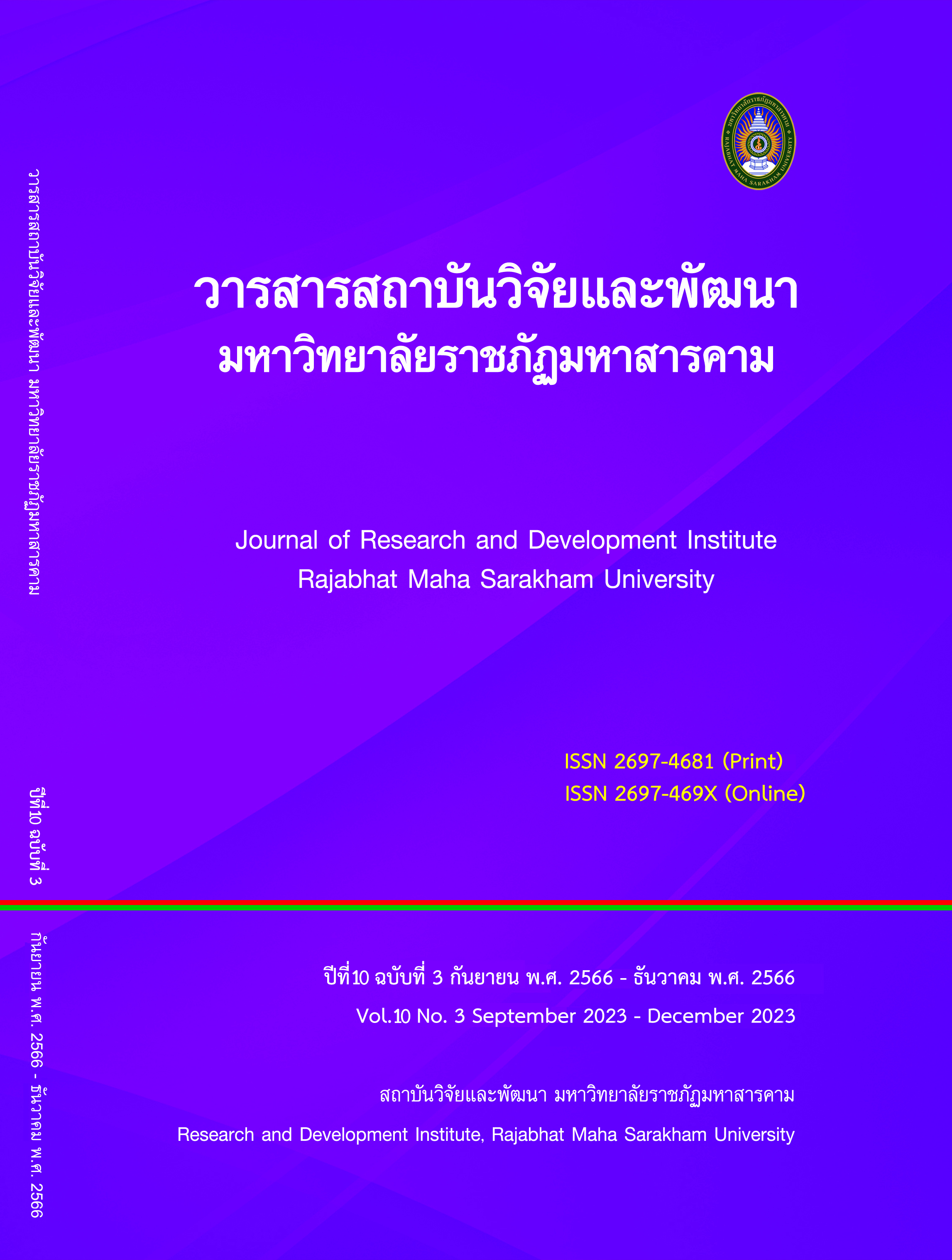LEARNING MANAGEMENT HISTORY METHOD AFFECTING ANALYTICAL THINKING ABILITY AND LEARNING ACHIEVEMENT OF GRADE 6 STUDENTS
Keywords:
Learning management, Historical methods, Analytical thinkingAbstract
The objectives of this research were to (1) improve the effectiveness of learning management with historical methods that affect the ability to think critically according to the 70/70 criteria, (2) study the ability to think critically and manage learning with historical methods, and (3) compare the pre- and post-school achievement of Grade 6 students. Samples used in this research Grade 6 students studying history 13 students 1 classroom Semester 2 of Academic Year 2021 Ban Khu Din Sai School Roi Et Primary Education Area Office District 2 Obtained from Cluster Random Sampling The research tools were 10 learning management plans, 3 subjective critical thinking abilities, 3 questions with difficulty values of 0.30-0.70, classification power values of 0.40-0.90, confidence values of 0.91, conformity index of 0.67-1.00, and 30 multiple-choice pre- and post-learning achievement assessments of 4 choices. The difficulty value is 0.30-0.60, the classification power value is 0.30-1.00, the confidence value is 0.97, and the consistency index is 0.67-1.00.
Management of historical methods that affect critical thinking abilities and academic achievement For Grade 6 students, the efficiency was 73.54/75.90, above the required threshold.
Students who have been organized learning through historical methods have the ability to think critically. 75.90 percent, which is higher than the threshold. 70 percent required
Students who are taught by historical methods have higher post-study achievement than before. statistically significant at the .05 level.
References
Benjamat B. (2017). Development of a history learning unit for Mathayom 4
students that affects academic achievement in history and analytical thinking. Master of Education Degree (Curriculum and teaching). Maha Sarakham Rajabhat University.
Bureau of Academic Affairs and Educational Standards, Ministry of Education. (2010).
Guidelines for organizing student development activities. According to the Basic Education Core Curriculum, B.E. 2007. Bangkok: Agricultural Cooperative Assembly of Thailand Publishing Company Limited.
Chaiyot P. (2011). Development of Chansen history learning activity sets using
historical methods that promote academic achievement and the ability to use historical processes for grade 5 students. Master of Education Thesis (Curriculum and teaching subject area). Naresuan University, Phitsanulok.
Chanakarn P. (2017). Promoting analytical thinking in history through self-directed
learning of Mathayom 2 students. Master of Education Thesis. Field of Study: Curriculum and Teaching: College of Education Dhurakij Pundit University
Kriengsak C. (2000). The wise man of education: synthesis, analysis and
application according to the royal speech on education and human development. Bangkok: Dan Suttha Printing
Luan S. & Angkana S. (1995). Educational research techniques. (4th printing).
Bangkok: Suviriyasan.
Ministry of Education. (2008). Basic Education Core Curriculum 2008. Bangkok:
Ministry of Education.
Ministry of Education. (2009). Basic Education Core Curriculum, 2008. Bangkok:
Agricultural Cooperative Assembly Press of Thailand.
Narong P. & Wuttichai M. (2018). Teacher's Manual, Aksorn Charoentat Publishing
House. Thai history subject, Mathayom 4-6, Social Studies learning group Religion and culture Basic Education Core Curriculum 2008. Bangkok: Aksorn Charoentat Publishing House.
Nithi E. (1982). Historical evidence in Thailand. Bangkok : Bannakit
Phaisan R. (2001). Effects of teaching with historical methods on academic
achievement on the topic of stable settlement of the Thai kingdom of Mathayom 1 students at Kamphaeng Phet Phitthayakhom School. Master of Education Thesis. (Education in Curriculum and Teaching). Sukhothai Thammathirat Open University.
Prasert N. & Winai P. (2000). Thai history How to study and teach: A guide to
organizing activities for teaching history. Basic knowledge of Sukhothai history. (pp. pp. 105-139). Ministry of Education, Department of Academic Affairs.
Rawiwan P., Malee T., & Chalermchai P. (editors). (2011). Friends, friends, teachers,
guidelines for organizing history learning activities. Bangkok : Cooperative Publishing House Agriculture of Thailand.
Supanee W. (2015). Developing a set of science learning activities to solve
problems Analytical thinking according to Marzano's principles for
Mathayom 2 students. Doctor of Education Thesis. Maha Sarakham: Maha Sarakham University
Supattra K. (2015). Effects of teaching using historical methods on achievement.
Learning and ability to think analytically about ASEAN history For Mathayom 1 students at Ban Prasat School. Sisaket Province. KKU Research Journal (Graduate Studies) Humanities and Social Sciences, 1(2), 55–62. Retrieved from https://so04.tci-thaijo.org/index.php/gskkuhs/article/view/30424
Tutiyaporn P. (2008). Knowledge and understanding of historical methods. and
opinions regarding the use of historical methods in teaching and learning. of social studies teachers at the secondary level [Grades 3 to 4] in Khon Kaen Province. Khon Kaen University/Khon Kaen.
Wanarat R. (2015). Effects of using historical methods on academic achievement
and skills Analytical thinking on the development of the Sukhothai Kingdom For Mathayom 1 students at Muang Sri Thep School Phetchabun Province. Sakon Nakhon Rajabhat University.
Downloads
Published
How to Cite
Issue
Section
License
Copyright (c) 2023 ศศิธร นาเมือง

This work is licensed under a Creative Commons Attribution-NonCommercial-NoDerivatives 4.0 International License.
Articles that are published are copyrighted by the authors of the articles







